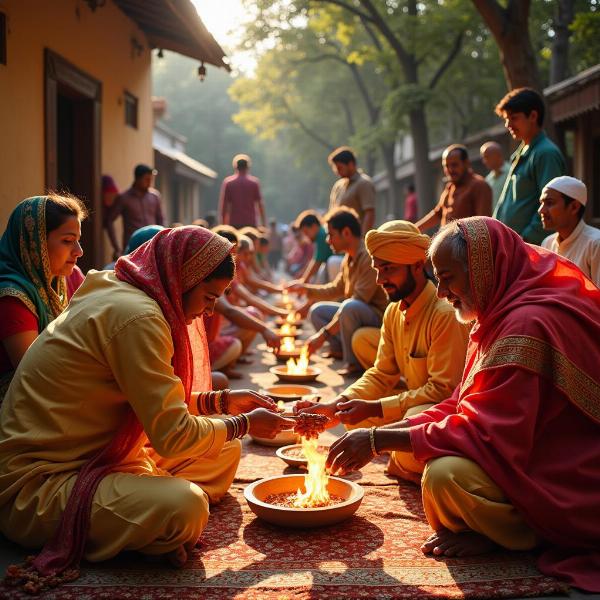Circumcision surgery, known as “sunnat” (सुन्नत) or “khatna” (खतना) in Hindi, is a common procedure involving the removal of the foreskin covering the tip of the penis. This practice is prevalent across various cultures and religions, including Islam and Judaism, and is often performed for religious, cultural, or medical reasons. Understanding the meaning and implications of circumcision surgery in the Indian context requires considering its historical, religious, and social significance.
What Does Circumcision Surgery (Sunnat/Khatna) Entail?
Circumcision surgery is typically performed on newborn babies or young boys, although it can be done on adult males as well. The procedure involves the surgical removal of the foreskin, the skin that covers the glans (head) of the penis. While traditionally performed by religious practitioners, the procedure is increasingly conducted by medical professionals in sterile clinical settings. The surgery itself is relatively quick, but proper aftercare is essential to prevent infections and ensure proper healing.
Religious and Cultural Significance of Sunnat in India
In India, circumcision is most commonly associated with the Muslim community, where it is considered an essential religious rite. It is often seen as a symbolic act of purification and a sign of belonging to the Islamic faith. The timing of the procedure varies, but it’s often performed during infancy or before puberty.
 Sunnat Ceremony in India
Sunnat Ceremony in India
For some communities, the sunnat ceremony is a significant social event involving family gatherings and celebrations. It marks an important milestone in a boy’s life and reinforces his identity within the community.
Medical Considerations of Khatna
Beyond religious and cultural reasons, circumcision can also be performed for medical reasons. These include:
- Phimosis: A condition where the foreskin is too tight and cannot be retracted over the glans.
- Paraphimosis: A medical emergency where the retracted foreskin cannot be returned to its normal position.
- Balanitis: Recurring inflammation of the glans or foreskin.
- Prevention of certain sexually transmitted infections (STIs).
It’s important to note that the medical benefits of circumcision are still a subject of debate among medical professionals. It’s crucial to consult with a doctor to understand the potential risks and benefits before making a decision.
Circumcision Aftercare: What to Expect
Following circumcision surgery, proper aftercare is vital for ensuring proper healing and preventing complications. The wound typically heals within a week or two. Regular cleaning with mild soap and water, application of prescribed ointments, and avoiding strenuous activities are essential parts of the aftercare process.
How Much Does Sunnat Cost in India?
The cost of circumcision surgery in India can vary depending on several factors, including the location, the type of facility (hospital or clinic), and the expertise of the medical professional. It’s advisable to contact different healthcare providers to get an estimate and choose the best option based on individual needs and budget.
Choosing a Doctor for Khatna: Key Considerations
Choosing the right medical professional for circumcision is crucial. Consider factors like the doctor’s experience, qualifications, and the sterility of the clinic or hospital. It’s also important to discuss the procedure in detail with the doctor to understand the risks and benefits and address any concerns.
Conclusion: Understanding Circumcision Surgery in the Indian Context
Circumcision surgery (sunnat/khatna) holds significant religious, cultural, and medical implications in India. While deeply rooted in tradition, it’s crucial to approach the decision with informed consent and awareness of both the traditional and medical perspectives. Whether for religious, cultural, or medical reasons, it is essential to seek professional medical advice and ensure the procedure is carried out safely and hygienically.
FAQ
- What is the Hindi word for circumcision? The Hindi words for circumcision are “sunnat” (सुन्नत) and “khatna” (खतना).
- Is circumcision mandatory in Islam? While considered a highly recommended practice, it’s not strictly mandatory in all interpretations of Islam.
- What are the risks associated with circumcision? Potential risks include bleeding, infection, pain, and complications during healing.
- When is the best time to perform circumcision? The timing varies based on religious and cultural practices, but it can be performed during infancy, childhood, or adulthood.
- Is anesthesia used during circumcision? Local or general anesthesia is typically used to minimize pain and discomfort during the procedure.
- How long does it take for circumcision to heal? Healing typically takes a week or two, but it’s essential to follow proper aftercare instructions.
- Can circumcision be performed on adults? Yes, circumcision can be performed on adult males, but the procedure might be slightly different than in infants.
Meaning-Hindi.in provides expert translation services for a wide range of documents, including medical and legal documents. We understand the nuances of Hindi and the cultural context of India, ensuring accurate and sensitive translations. Need help with translating medical information related to circumcision surgery? Our expert translators can assist you. Contact us at [email protected] or call us at +91 11-4502-7584. Meaning-Hindi.in is your trusted partner for all your Hindi translation needs.